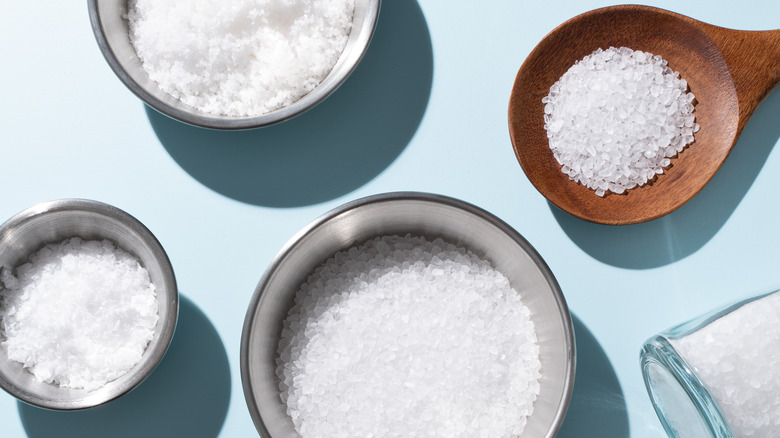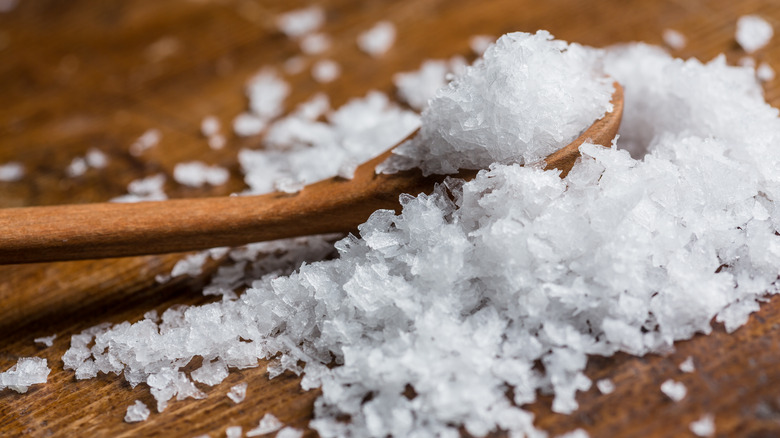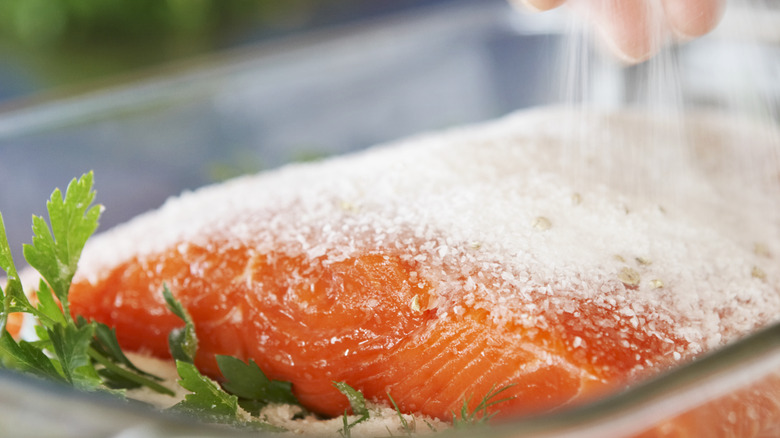Maldon Vs Kosher Salt: What's The Difference?
When it comes to cooking, perhaps the most important ingredient is salt. It has been used since time immemorial, not just to season and enhance flavors but to preserve food in various ways. It is important, however, to note that not all salts are created equal — there are myriad types of salt produced all over the world, each with their own shape, flavor, and texture. Beautifully shaped or colorful salts are ideal for finishing and garnishing dishes, while flaky, moister salts are great for cooking, as they will dissolve faster and more evenly.
Two of the types most commonly used in kitchens at home and in restaurants are Maldon salt and kosher salt. But how are they different, and what are the best uses for each of them? There are many differences in how they are harvested, their level of salinity, the size and shape of the crystals, and the best ways to use them, and both have their merits in the kitchen depending on your needs.
What is Maldon salt?
Maldon salt is a sea salt harvested in the coastal town of Maldon, Essex on the southeast coast of England. Since 1882, the Maldon Salt Company has been producing this unique salt using artisanal methods to obtain delicate pyramid-shaped crystals from the marshy waters where the Blackwater River estuary meets the sea. The Osborne family acquired the company in 1922, and now, four generations of salt makers continue the regional tradition of hand harvesting salt that began over a hundred years ago. Maldon salt is so esteemed that Queen Elizabeth II designated it with a Royal Warrant.
There are a few ways in which Maldon differs from kosher salt. Maldon crystals are larger than kosher salt flakes, making it a bit saltier. However, because Maldon salt comes from sea water that has naturally mixed with fresh river water, it has a mild, bright flavor that some describe as having a light sweetness. As with all sea salt, Maldon has its own terroir thanks to its specific mineral content, which makes its flavor unique. The beautiful crystals make it a perfect garnish, and its texture is ideal to add a salty crunch to salads, fruit, meats right off the grill, and even baked goods. But it's also easy to crumble between your fingers to add to sauces, stews, and marinades if you want to use it that way too.
What is Kosher salt?
Kosher salt gets its name from the process of koshering meat, in which it plays a key role in drawing blood and moisture out of the meat. It comes from underground salt mines which are flooded to dissolve the salt — The saline water is then evaporated to obtain the salt crystals. In order to be certified kosher, it must be made under rabbinical supervision. However, in stark contrast with Maldon salt, kosher salt is mass-produced instead of naturally sourced through artisanal methods. Because of this production method, kosher salt is much cheaper, its crystals more even in size and shape, and its flavor more consistent since it's comprised almost 100% of sodium chloride without the trace minerals found in natural sea salts.
There are many reasons why chefs choose kosher salt. It is easier to measure since the flakes are smaller and even, the flavor is neutral, and it's more affordable to use in larger quantities. It is a staple for curing meat or fish such as salmon and ideal for rimming your cocktail glass, as the flat flakes adhere better and are less likely to clump. Plus, the size and shape of the flakes make it easy to grab a pinch with your fingers and sprinkle liberally onto food.


